Public Policy
Hey, You!
 In the weeks since I sent you my last update about the Greater Good Initiative, I’ve heard from, and talked with, many of you about what this initiative could become beyond an annual conference (and we’ve already started planning for the November 2018 installment – more in a future update!). As a result, I’ve made some progress – and now I’m hoping for some further input from you.
In the weeks since I sent you my last update about the Greater Good Initiative, I’ve heard from, and talked with, many of you about what this initiative could become beyond an annual conference (and we’ve already started planning for the November 2018 installment – more in a future update!). As a result, I’ve made some progress – and now I’m hoping for some further input from you.
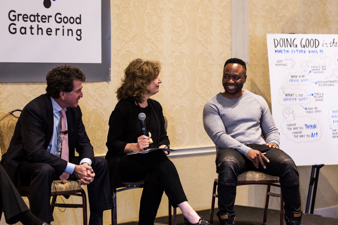
At the most grandiose extreme, some have suggested to me that the Greater Good should be the beginnings of a new political party. While we certainly need political change – on both sides of the aisle – a new party isn’t really viable under our system (and I’m not the guy to start it). The most “successful” third party in the U.S. was the Progressives … who were so successful they went out of business: The two established parties were forced to co-opt the Progressive agenda, which then essentially became the reigning American ideology for the bulk of the 20th Century. In short, we don’t need an alternative party so much as an alternative agenda that can play the same role in the 21st Century. And that does strike me as a good function for the Greater Good Initiative.
 While such an agenda starts with making government work better to redress injustice and unfairness, it also needs to address a broader range of mechanisms for change and social progress. We need to think of “governance” as something that occurs in institutions other than just the nation-state or the public sector, and “politics” as embracing not just governmental but also market and civil-society interactions (a point I made in this prior update).
While such an agenda starts with making government work better to redress injustice and unfairness, it also needs to address a broader range of mechanisms for change and social progress. We need to think of “governance” as something that occurs in institutions other than just the nation-state or the public sector, and “politics” as embracing not just governmental but also market and civil-society interactions (a point I made in this prior update).
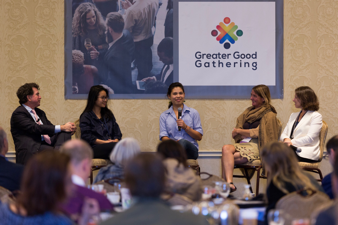 So I want to make sure that the Greater Good Initiative gets beyond simply political discussion and embraces civic and economic entrepreneurship – a key theme of the first Greater Good Gathering. In recent weeks, I’ve talked with several of the young social entrepreneurs who spoke at the conference (if you haven’t yet, you should watch the video highlights of their presentations) about how best to encourage and support people like them developing non-governmental solutions to social problems. Their answer lies – as in so many areas – in supportive networks of people and information. Some of that comes in the form of incubators and co-working spaces – but it also needs to come through non-location-specific networks. We need to incorporate mechanisms for developing, encouraging and supporting social entrepreneurship – the actual doing of social change – to make this initiative a web of individual actions advancing the greater good, not just calls for a government that does so.
So I want to make sure that the Greater Good Initiative gets beyond simply political discussion and embraces civic and economic entrepreneurship – a key theme of the first Greater Good Gathering. In recent weeks, I’ve talked with several of the young social entrepreneurs who spoke at the conference (if you haven’t yet, you should watch the video highlights of their presentations) about how best to encourage and support people like them developing non-governmental solutions to social problems. Their answer lies – as in so many areas – in supportive networks of people and information. Some of that comes in the form of incubators and co-working spaces – but it also needs to come through non-location-specific networks. We need to incorporate mechanisms for developing, encouraging and supporting social entrepreneurship – the actual doing of social change – to make this initiative a web of individual actions advancing the greater good, not just calls for a government that does so.
 Most people in fact have seen in the Greater Good Initiative some sort of “distributed” process, mirroring the way I’ve argued that technologies like blockchain are going to transform society and all power structures. Nevertheless, the literature on the burgeoning phenomenon of “leaderless movements” indicates they peter out without a well-defined agenda – and that agenda has to come from some sort of “elite” or “leadership.” So the challenge is how to create an agenda with expert input and leadership while retaining the essential character of a distributed, grass-roots movement. Rather than an institutionalized “think tank,” this requires a fluid thought process – assembling experts with diverse views to “think differently” and come up with answers that the political system, with its current no-compromise dynamic, won’t entertain.
Most people in fact have seen in the Greater Good Initiative some sort of “distributed” process, mirroring the way I’ve argued that technologies like blockchain are going to transform society and all power structures. Nevertheless, the literature on the burgeoning phenomenon of “leaderless movements” indicates they peter out without a well-defined agenda – and that agenda has to come from some sort of “elite” or “leadership.” So the challenge is how to create an agenda with expert input and leadership while retaining the essential character of a distributed, grass-roots movement. Rather than an institutionalized “think tank,” this requires a fluid thought process – assembling experts with diverse views to “think differently” and come up with answers that the political system, with its current no-compromise dynamic, won’t entertain.
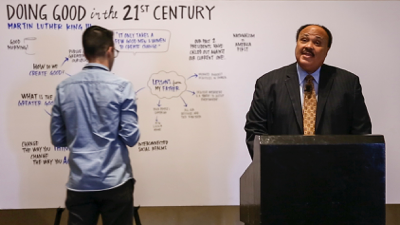 But this also can’t be just an elite-only, centralized process: This must be a process of discussion and dialogue that’s two-way, both vertically and horizontally, in which individuals and groups are free to devise their own agendas and solutions but also out of which broad consensus hopefully emerges – something like a live version of a “wiki” that starts with some sort of thoughtful core but not (like think tanks today) driven by a pre-existing ideological goal.
But this also can’t be just an elite-only, centralized process: This must be a process of discussion and dialogue that’s two-way, both vertically and horizontally, in which individuals and groups are free to devise their own agendas and solutions but also out of which broad consensus hopefully emerges – something like a live version of a “wiki” that starts with some sort of thoughtful core but not (like think tanks today) driven by a pre-existing ideological goal.
Each individual “node” in this network could follow its own model: a local “Greater Good Gathering” organized by folks in Gatlinburg, a monthly meet-up in Minnetonka, a “koffee klatch” in Kalamazoo, a book club in Bethesda, a discussion group in Des Moines, a social enterprise incubator in Inverness, or lone individuals in the Lone Star State, all contributing their concerns and solutions and feeding off the ideas of others in a dispersed national network devoted to building the Greater Good.
 That’s what I’m working on building. How? I don’t know yet – that’s why I’m asking you. After all, that’s what’s gotten the concept this far. Please let me know your thoughts in the comments below or email me at eschnurer@public-works.org.
That’s what I’m working on building. How? I don’t know yet – that’s why I’m asking you. After all, that’s what’s gotten the concept this far. Please let me know your thoughts in the comments below or email me at eschnurer@public-works.org.
Thanks,

Hurricane Donald
 In the past month, I’ve written a trifecta of articles on a diverse set of issues in the news – the cultural divide within the country, international relations, Puerto Rico’s needs. But they all have one thing in common: the destructive nature of Donald Trump. Here are the highlights – but first a reminder:
In the past month, I’ve written a trifecta of articles on a diverse set of issues in the news – the cultural divide within the country, international relations, Puerto Rico’s needs. But they all have one thing in common: the destructive nature of Donald Trump. Here are the highlights – but first a reminder:
Check out the incredible line up of Speakers and register TODAY! Space is limited.
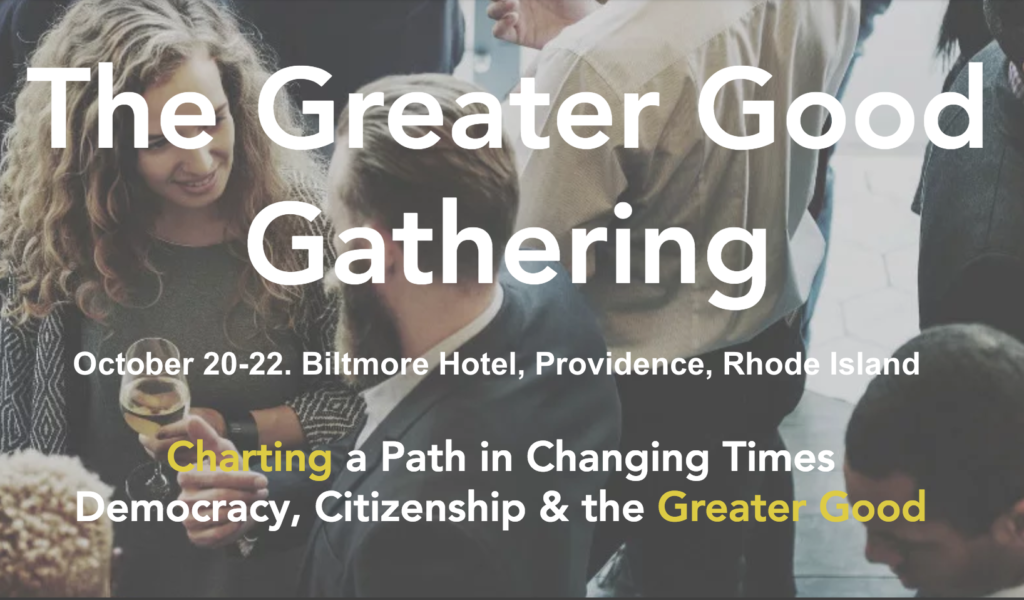
Let’s start with Puerto Rico, which I wrote about this week in US News & World Report. I’ve spent a lot of time in Puerto Rico in the last several years, working on the Commonwealth’s fiscal situation and economy. Puerto Rico offers – as did New Orleans, in the wake of Hurricane Katrina – an unusual opportunity for creative solutions, some of which I discuss in this article.
These will require resources. Yet Trump uttered “jaw-dropping comments in Puerto Rico itself” like, “It’s a great trip. Your weather is second to none,” while complaining that “You’ve thrown our budget a little out of whack.” The headline on the piece, Trump’s Past, Puerto Rico’s Future, doesn’t quite lay on the irony as thickly as I’d intended, but here’s the main argument:
How did Trump recover from the unmitigated disaster of his own financial choices? By declaring bankruptcy, refusing to pay his bills and restructuring in ways that left him an income and everyone else with the debts. Instead of railing against the Puerto Ricans for their failure to pull themselves up by their own bootstraps, in this instance Trump for once actually could profitably offer his preferred example for everything: himself.
… Puerto Rico needs a fresh chance to restructure operations, escape its debt, obtain massive new infusions of cash, and rebrand itself as a leader. And it needs all the rest of us to be complicit in that. Just as Donald Trump did.
This begins to get at the point that Trump’s personal brand of dysfunctionality both epitomizes and drives virtually all the spiraling challenges facing the country today. The State of Nation-States is a somewhat academic piece tackling “a point Trump made in passing” in his speech to the United Nations: “that, as he put it, ‘the nation-state remains the best vehicle for elevating the human condition.’” This proposition is debatable because the original impetus for the nation-state “was to reduce violence at the international level … while giving nation-states explicit and unlimited control over violence within their borders – not simply policing against violence but wielding it against their own citizens however they see fit.” Until a year or so ago, most Americans and Europeans would have agreed with “circumscrib[ing] the rights of nations to do whatever they want to the peoples within their borders” – i.e., “human rights” – but global changes are making many more sympathetic to authoritarian regimes.
The new virtual economy leapfrogs borders and generates changes that are leaving many behind economically and undermining aspects of their lives that they until now have taken for granted. For those less globally connected, the threats – physical, cultural, religious and economic (as well as cosmopolites who don’t seem to mind all those) – all seem associated with territoriality. The traditional nation-state therefore appears to be their bulwark, forging an odd, new coalition between traditionalists in cutting-edge economies and repressive states with extractive economies – personified in the rise of Donald Trump.
That takes me to the piece I grappled with for weeks and rewrote multiple times in the wake of the violence in Charlottesville and Trump’s kulturkampf reaction to it – The Rise of Zero-Sum Politics – which concluded:
For all the Hitler comparisons, Trump is really more reminiscent of Mao: Besides seething resentment and authoritarianism, Mao’s most notable personality trait was a constant need to throw everything around him into chaos. Having fractured the Republican Party into its constituent parts and driven a wedge between them, Trump, with his unerring sense for disruption, now has embraced the opposition.
I ended with a perhaps implausible prediction: Eventually, “Trump will endorse some form of single-payer health care plan” – not because he supports the idea (he obviously has no clue on health policy), but rather because “it would wipe Obamacare off the books” and “rupture the Democrats as badly as he has already his own party.” We’ll see if I’m right.
As usual, I welcome your comments below!
A Rewarding Year for Consulting
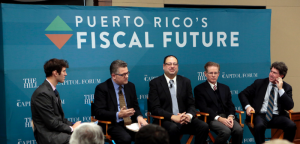 2015 has been a good year for my consulting firm, Public Works LLC. We’ve had 23 consultants and staff at work on over a dozen projects stretching from Alaska to Puerto Rico, and covering all the firm’s major areas of traditional strength.
2015 has been a good year for my consulting firm, Public Works LLC. We’ve had 23 consultants and staff at work on over a dozen projects stretching from Alaska to Puerto Rico, and covering all the firm’s major areas of traditional strength.
As always, the bulk of our work has come in government spending and efficiency. We were retained to help close budget gaps in two of the most high-profile fiscal challenges in the country: Over the late spring and early summer, we worked with Puerto Rico Senate President Eduardo Bhatia to help stanch the flow of red ink in the Commonwealth’s budget. I wrote about the Puerto Rico budget situation this past summer and appeared on a panel to discuss possible solutions on Capitol Hill last month.
Meanwhile, we undertook similar work in late summer and early fall to address the City of Chicago’s budget gap. Thanks to union leaders like Chicago Federation of Labor President Jorge Ramirez and conscientious city officials like budget director Alexandra Holt, we helped to develop a package totaling over $100 million in savings. We rounded out the year improving the fleet efficiency of one of the largest independent public authorities in the country, and launching an efficiency review of the county government in Travis County (Austin), Texas.
The year opened with finishing development of a strategic plan for human services in Broward County (Ft. Lauderdale) Florida, and launching a review of the Alaska Department of Health and Social Services. Our final report in Alaska was just released publicly last week. Meanwhile, we’re providing the subject-matter and analytic expertise on a 5-year, federally-funded study of minority health disparities in Virginia.
We’ve also been expanding our education footprint, with a performance review of four school districts in South Carolina, and two more reviews now underway in Alaska, of both the state’s preK-12 and higher ed systems. Meanwhile, we’ve spent the latter half of 2015 preparing the Comprehensive System Improvement Plan for Rhode Island’s workforce investment system, the subject area in which we’ve probably undertaken the most work in recent years.
We’re expecting 2016 to be even better: Half of these contracts extend well into the New Year, totaling 70% as much work signed on already for 2016 as we had for all of 2015. We’re therefore expecting a close-to-record year in 2016. We’re also expecting some major announcements early in the New Year, so stay tuned!
In the meantime, all of us at Public Works wish all of you, and your families, a healthy and happy holiday season.






